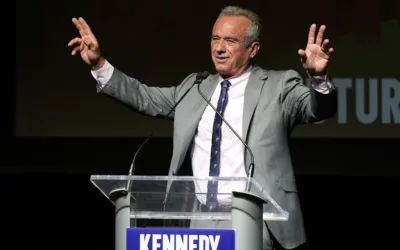
Former President Donald Trump departs after a visit with campaign volunteers at the Elks Lodge, Tuesday, July 18, 2023, in Cedar Rapids, Iowa. (AP Photo/Charlie Neibergall)
Trump is expected to face chargers over his effort to overturn the 2020 election—a ploy that if successful, would have effectively ended America’s 200-plus year experiment in democracy and caused a constitutional crisis in the most powerful country in the world.
It’s been two and a half years since Donald Trump tried to overturn the 2020 presidential election and incited a deadly attack on the US Capitol, but the former president and 2024 Republican frontrunner appears to be on the verge of facing accountability for his actions.
Trump announced on Tuesday that he had received a “target letter” from federal prosecutors involved in Special Counsel Jack Smith’s investigation into Trump’s quest to overturn the election, an effort that culminated in the Jan. 6 insurrection that left five people dead and hundreds of police officers injured.
Posting to his Truth Social platform, Trump said he received a letter noting he was a “TARGET” of the Jan. 6 grand jury investigation and was given four days to report to the grand jury.
This “almost always means an Arrest and Indictment,” Trump wrote, before launching into a diatribe against Smith, the Department of Justice (which appointed Smith), and President Joe Biden.
Trump did not mention what charges, if any, were specified in the letter, but by Tuesday evening, Rolling Stone and several other outlets reported that the target letter indicated the charges were related to “conspiracy to commit offense or to defraud the United States; deprivation of rights under color of law; and tampering with a witness, victim, or an informant.”
The specter of charges comes as Trump holds a commanding lead in the 2024 Republican presidential primary, a field with few candidates willing to directly criticize Trump’s efforts to overturn the 2020 election—a ploy that if successful, would have effectively ended America’s 200-plus year experiment in democracy and caused a constitutional crisis in the most powerful country in the world.
Evidence of Trump’s role in the plot is extensive, and much of it was presented to the public during hearings held last summer by the US House Select Committee on the January 6 Attack. Dozens of Republican officials—including members of his own administration—painted a picture of a president willing to commit crimes to stay in office. They revealed that Trump:
- was repeatedly by his own allies told the 2020 election was stolen, but embraced various conspiracy theories to try and stay in power.
- tried to bully the Department of Justice to help him overturn the election results and sought to install a crony loyalist to lead the department.
- tried to pressure state lawmakers to block certification of election results.
- embraced the outlandish legal ideas of lawyer John Eastman, who embraced the false notion that the vice president could approve alternate electors or send results back to individual states to recertify in order to hand the election to Trump.
- knew some of the Jan. 6 protesters were armed before he encouraged them to go to the Capitol.
- thought his vice president, Mike Pence, deserved to be hung on Jan. 6 for refusing to go along with the alternate electors scheme.
The hearings also revealed that right-wing extremists were in communication with the White House following the election, that top officials in the Trump administration were repeatedly warned of violence ahead of Jan. 6, and that Trump did not care that supporters who attended his rally—and later stormed the Capitol—on Jan. 6 were armed.
Trump is likely to be charged in Washington D.C., where federal grand juries have been hearing evidence against him.
Despite a litany of evidence documenting Trump’s role in the effort to overturn the election, most of his fellow opponents in the Republican presidential primary field shied away from directly criticizing him or commenting on whether he should be held accountable for his effort to overturn democracy.
Speaking in South Carolina, Florida Gov. Ron DeSantis said Trump “should have come out more forcefully” as rioters attacked the Capitol, but said Trump’s actions fell short of criminal activity.
“I hope he doesn’t get charged,” DeSantis said later in the day during an interview with CNN
Vivek Ramaswamy told POLITICO he “would have made very different judgments than President Trump did” on Jan. 6, but also took to Twitter to call the potential charges “the ultimate threat” to democracy.
Even Pence—who was in physical danger on Jan. 6 as a result of Trump’s actions—said Trump shouldn’t be indicted for his actions.
“I believe that history will hold him to account for his actions that day,” Pence said Tuesday on NewsNation. “I’m not convinced that the president acting on bad advice of a group of crank lawyers that came into the White House in the days before Jan. 6 is actually criminal.”
The only candidates in the field who were willing to openly critique Trump were former Arkansas governor Asa Hutchinson and former New Jersey governor Chris Christie.
“While Donald Trump would like the American people to believe that he is the victim in this situation, the truth is that the real victims of January 6th were our democracy, our rule of law, and those Capitol Police officers who worked valiantly to protect our Capitol,” Hutchinson said in a statement.
Hutchinson added that “Donald Trump’s actions on Jan. 6 should disqualify him from ever being president again.”
Christie, meanwhile, said Trump’s “conduct on January 6th proves he doesn’t care about our country & our Constitution.”
House Republicans also remained largely silent or actively expressed support for Trump. House Speaker Kevin McCarthy accused the Biden administration of trying to “weaponize government to go after their No. 1 opponent.”
Trump’s announcement wasn’t the only major news related to his effort to overturn the 2020 election on Tuesday.
Former Arizona Gov. Doug Ducey, who resisted Trump’s efforts to overturn Biden’s win in his state in 2020, told CNN via a spokesman that he was contacted by the special counsel and would “do the right thing.”
In Michigan, meanwhile, state Attorney General Dana Nessel charged 16 Michigan residents with felonies over their roles in the “false elector” scheme to overturn the 2020 presidential election.
The defendants are alleged to have secretly met in the basement of the Michigan Republican Party headquarters on December 14th, 2020, where they signed their names on multiple certificates stating they were the “duly elected and qualified electors for President and Vice President of the United States of America for the State of Michigan.”
These fake documents were then sent to the US Senate and National Archives in a (failed) effort to direct the state’s electoral votes to the candidate of their choosing, Donald Trump, in place of the candidate actually elected by Michigan voters, Joe Biden.
“That the effort failed and democracy prevailed does not erase the crimes of those who enacted the false electors plot,” Nessel said in a statement.
It is unclear exactly when Trump will be charged, but it could happen in a matter of days or weeks. If he’s ultimately indicted, it would mark the third time the former president has been indicted this year.
Trump was indicted by the Justice Department in June over his mishandling of classified documents that he kept after leaving office and was charged with 31 counts of violating the Espionage Act. That indictment alleges that Trump illegally left the White House with classified information “regarding defense and weapons capabilities of both the United States and foreign countries; United States nuclear programs; potential vulnerabilities of the United States and its allies to military attacks; and plans for possible retaliation in response to a foreign attack.”
Trump was also indicted in New York in April on 34 felony counts of falsifying business records over allegations that he made secret hush money payments to porn star Stormy Daniels. He also faces a separate investigation in Georgia for his efforts to overturn the 2020 election in that state.
Trump’s continued legal troubles have hurt his standing with voters, with 62% believing he’s committed a crime and only 32% believing he hasn’t, according to a June Navigator survey of 1,000 registered voters. The poll also found that 58% of voters believe Trump is unfit to serve as president again and that 63% believe Trump thinks he’s above the law.
Despite all this baggage, Trump remains the likely Republican nominee for president in 2024, and he’s made clear that if elected again, he plans to completely gut the federal government in order to consolidate power and effectively create an authoritarian government—finishing what he tried to start in 2020.

This billionaire’s PAC is spreading a big lie about Tammy Baldwin, Medicare, and taxpayer savings
Restoration PAC, funded by Uline’s Richard Uihlein, twists the significance of forcing Big Pharma to negotiate for lower bulk pricing on Medicare...

New Biden rules deliver automatic cash refunds for canceled flights, ban surprise fees
In the aftermath of a canceled or delayed flight, there’s nothing less appealing than spending hours on the phone waiting to speak with an airline...

Opinion: It’s time for Congress to fight for small businesses instead of big corporations
May is National Small Business Month. Our elected leaders need to show leadership all year long. For the past 27 years I’ve been fortunate to pursue...

Biden makes 4 million more workers eligible for overtime pay
The Biden administration announced a new rule Tuesday to expand overtime pay for around 4 million lower-paid salaried employees nationwide. The...




